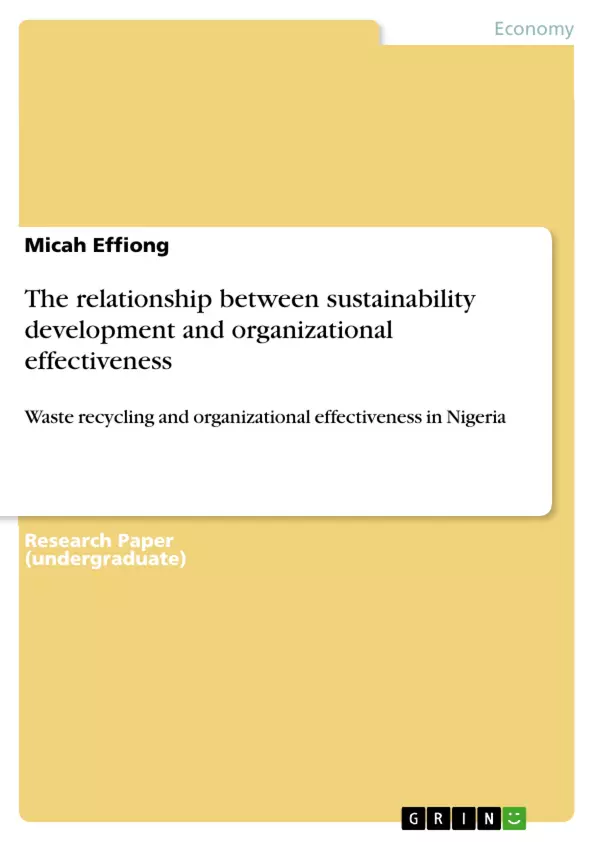This study examines the relationship between sustainable development practices and organizational effectiveness in manufacturing firms in Port Harcourt, Nigeria. The work specifically examines the relationship between waste recycling and the increase in output in manufacturing firms, investigates the relationship between waste recycling and cost reduction, the relationship between waste recycling and increase in sales volume in manufacturing firms and determines the relationship between waste recycling and environmental pollution reduction in manufacturing.
Global warming and increased pollution from all aspect of business activities highlight the importance of green management for firms operating in Nigeria and worldwide. More so, sustainable development practices is one of the elements that contributes directly or indirectly to business value. As the Nigerian population and its industries continue to grow, the problem of proper waste disposal becomes increasingly difficult. Products of the manufacturing process amplify the need for improved waste disposal. Efficiency is sometimes pursued at the expense of environmental sustainability. To produce as much as possible in the most cost-effective manner, manufacturers may adopt practices that appear to be cheap but are actually resource-intensive in the long run.
The perspectives on manufacturing companies operations have expanded from economic to environmental and social aspects in current trends. Manufacturing companies are not only aiming to improve operations in terms of flexibility, delivery, quality, and cost, but also attempting to be competitive in terms of economic, environmental and social issues. Hence understating sustainable developmental practices is necessary and should be prioritized in the decision-making processes by company management.
Inhaltsverzeichnis (Table of Contents)
- ABSTRACT
- CHAPTER ONE
- INTRODUCTION
- Background to the Study
- Statements of the Problem
- Objectives of the Study
- Research Questions
- Research Hypotheses
- Significance of the Study
- Scope and Limitations of the Study
- Definition of Terms
- Conclusion
- CHAPTER TWO
- REVIEW OF RELATED LITERATURE
- Introduction
- CONCEPTUAL FRAMEWORK
- Overview of Sustainability
- The Concept of Sustainability Development
- Environmental Sustainability
- Dimensions of Environmental Sustainability
- Waste Recycling
- Significance of waste recycling to manufacturing companies
- Benefits of the implementation of sustainable business practices
- Cost reduction
- Public relations
- Employee satisfaction
- Concept of Organizational Effectiveness
- Conceptual Model
- THEORETICAL FRAMEWORK
- Resource-based View Theory
- The Resource Dependence Theory
- EMPIRICAL REVIEW
- Conclusion
- CHAPTER THREE: RESEARCH METHODOLOGY
- Introduction
- Research Design
- Area of Study
- Population of the Study
- Sample Technique
- Sources of Data
- Data collection Instrument
- Validity of the Research Instrument
- Reliability of Research Instrument
- Administration of the Instrument
- Scoring of Research Instrument
- Method of Data Analysis
- Statistical Measure
- Model Specification
- Decision Rule Regarding Testing of the Hypotheses
- CHAPTER FOUR: DATA PRESENTATION, ANALYSIS AND DISCUSSION OF
FINDINGS
- Introduction
- Presentation of Data
- Testing of Hypotheses
- Discussion of Finding
- CHAPTER FIVE: SUMMARY, CONCLUSION AND RECOMMENDATION
- INTRODUCTION
- SUMMARY OF FINDINGS
Zielsetzung und Themenschwerpunkte (Objectives and Key Themes)
This study aims to investigate the relationship between sustainable development practices and organizational effectiveness in manufacturing firms located in Port Harcourt, Rivers State, Nigeria. Specifically, the study explores the link between waste recycling and various organizational outcomes, including increased output, cost reduction, sales volume, and environmental pollution reduction.
- Sustainable Development Practices in Manufacturing
- Organizational Effectiveness and its Determinants
- The Relationship Between Waste Recycling and Organizational Performance
- The Role of Sustainability in Achieving Competitive Advantage
- The Impact of Sustainable Practices on Environmental Sustainability
Zusammenfassung der Kapitel (Chapter Summaries)
- Chapter One: Introduction This chapter provides an overview of the study, outlining its background, problem statement, research questions, objectives, hypotheses, significance, scope, limitations, and definitions of key terms. It establishes the context for the research by highlighting the growing importance of sustainability in the manufacturing industry.
- Chapter Two: Review of Related Literature This chapter presents a comprehensive review of existing literature on sustainability development, organizational effectiveness, and the relationship between these concepts. It explores theoretical frameworks such as the Resource-based View Theory and the Resource Dependence Theory to provide a foundation for the study.
- Chapter Three: Research Methodology This chapter details the research methodology used in the study, including the research design, area of study, population, sampling technique, data collection methods, data analysis techniques, and ethical considerations. It outlines the steps taken to ensure the reliability and validity of the data collection process.
- Chapter Four: Data Presentation, Analysis, and Discussion of Findings This chapter presents the findings of the study, using tables and statistical analysis to analyze the data collected from the participating manufacturing firms. It interprets the results and discusses their implications for the relationship between sustainable development practices and organizational effectiveness.
Schlüsselwörter (Keywords)
The key terms and focus topics of this study include: sustainable development, organizational effectiveness, waste recycling, manufacturing firms, environmental sustainability, resource-based view theory, resource dependence theory, competitive advantage, and empirical research.
Frequently Asked Questions
What is the link between waste recycling and organizational effectiveness?
Recycling can lead to cost reduction, increased production output, and improved brand image, all of which contribute to the overall effectiveness of a manufacturing firm.
Why is sustainability important for Nigerian manufacturing firms?
With a growing population and industrial sector, proper waste disposal and environmental protection are crucial to mitigate global warming and resource depletion.
What is the Resource-based View Theory?
It is a theoretical framework suggesting that firms achieve competitive advantage by developing and utilizing unique, sustainable resources and capabilities.
How does waste recycling affect cost reduction?
Recycling reduces the need for raw materials and lowers waste disposal fees, leading to long-term operational savings for the company.
Can sustainable practices improve employee satisfaction?
Yes, studies indicate that employees often feel more engaged and satisfied when working for organizations that demonstrate environmental and social responsibility.
- Quote paper
- Micah Effiong (Author), 2019, The relationship between sustainability development and organizational effectiveness, Munich, GRIN Verlag, https://www.grin.com/document/514806



